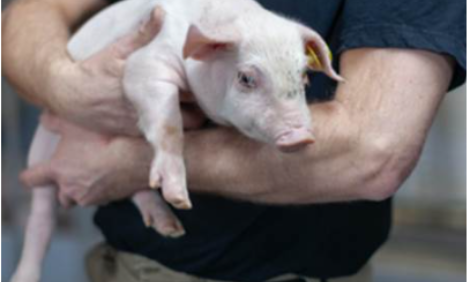



Experimental Porcine Circovirus Type 1 (PCV1) Infections in Mid-Gestational Porcine Foetuses
PCV1 was generally thought to be non-pathogenic to pigs and this is among the first papers to be published on infections in piglets before birth. The virus can replicate and may produce pathology in the lungs of porcine foetuses inoculated at 55-days of foetal life, according to new research from the University of Ghent.PCV1 has been described as a non-cytopathic contaminant of the PK-15 cell line; several experimental infections with PCV1 failed to reproduce disease in pigs, according to Dipongkor Saha at the University of Ghent and co-authors there and at KATHO Catholic University College of South-West Flanders and the Veterinary and Agrochemical Research Centre in Brussels. In their paper, published in BMC Veterinary Research, they explain that PCV1 is generally accepted as non-pathogenic to pigs. To the researchers' knowledge, nothing is known about the outcome of PCV1 infections in porcine foetuses so they examined this aspect in the present study.
Nine foetuses from three sows were inoculated at 55 days of gestation: three with 104.3 TCID50 of the PCV1 cell culture strain ATCC-CCL33, three with 104.3 TCID50 of the PCV1 field strain 3384 and three with cell culture medium (mock-inoculated).
At 21 days post-inoculation, all six PCV1-inoculated and all three mock-inoculated foetuses had a normal external appearance. Microscopic lesions characterised by severe haemorrhages were observed in the lungs of two foetuses inoculated with CCL33.
High PCV1 titres (up to 104.7 TCID50 per gramme of tissue) were found in the lungs of the CCL33-inoculated foetuses.
All other organs of the CCL33-inoculated foetuses and all the organs of the 3384-inoculated foetuses were negative (<101.7 TCID50 per gramme of tissue) by virus titration.
PCV1-positive cells (up to 121 cells per 10mm2 in CCL33-inoculated foetuses and up to 13 cells per 10mm2 in 3384-inoculated foetuses) were found in the heart, lungs, spleen, liver, thymus and tonsils. PCR and DNA sequencing of Rep recovered CCL33 or 3384 sequences from CCL33- or 3384-inoculated foetuses, respectively.
Saha and co-authors conclude that, from their study, cell culture PCV1 can replicate efficiently and produce pathology in the lungs of porcine foetuses inoculated at 55 days of foetal life.
Reference
Saha D., D.J. Lefebvre, R. Ducatelle, J.V. Doorsselaere and H.J. Nauwynck. 2011. Outcome of experimental porcine circovirus type 1 infections in mid-gestational porcine foetuses. BMC Veterinary Research, 7:64 doi:10.1186/1746-6148-7-64
Further Reading
| - | You can view the full report by clicking here. |
January 2012








